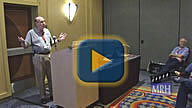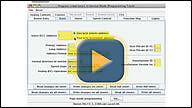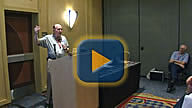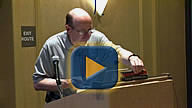Intro to DecoderPro - MRH Theater
Introduction to DecoderProLearn about the powerful free program DecoderPro in this clinic from the 2008 NMRA National Convention in Anaheim. If you are DCC user, you owe it to yourself to learn about and use DecoderPro. |
 |
|
|
|
|
|
|
|
|
|
Playback problems? Try playing this video from our mirror site. |
|
|
|
|
|
|
|
|
Playback problems? Try playing this video from our mirror site. |
|
|
|
|
|
|
|
|
Playback problems? Try playing this video from our mirror site. |
|
|
|
|
|
|
|
|
Playback problems? Try playing this video from our mirror site. |
|
|
|
|
ADDITIONAL DECODERPRO RESOURCES
|
|
>> Posts index
Navigation
Journals/Blogs
Recent Blog posts:




Comments
This week's Movie Monday - NEW and improved Segment 3
Once in a while our Movie Monday release will be a totally re-edited segment rather than an all-new video.
Segment 3 of this clinic video had many very tiny screen shots that were all but illegible.
So we completely re-edited this segment to zoom in much closer on the screen shots and make everything readable. A thorough re-edit takes almost as much effort as the initial edit, so we took the time this week to do the much-needed re-edit and are releasing the new-and-improved segment 3 as our Movie Monday release this week.
Next week, look for the first installment of the Decoder Pro Advanced clinic, featuring "Mr. DecoderPro" himself, Bob Jacobsen!
Decoderpro
Does anyone know how to get a CD for decoderpro as mentioned by Mr. Duchamp?
+
John,
You are aware it is a free download from the JMRI web site. If you still require a CD you can get a copy from the latest sponsor of MRH, Litchfield Station. But again it is a free download from the JMRI web site. The link I provide also has the link to the JMRI web site.
JMRI/DecoderPro CD:
http://www.litchfieldstation.com/DCC-University/FAQ-DecoderPro.htm
Marc F
WOW !!! This saved me a lot of frustration
This JMRI stuff is simply cool.
Having been away from HO scale/Digitrax for almost seven years, I pulled out my old Empire Builder set to find out that my DT100 throttle had not liked sitting in the box. That throttle was discontinued and there was no support and little to no chance to repair it. It was a little discouraging to see the giant (DT400) and somewhat expensive throttle that replaced it. Sooner or later, I will want a DT400 to control all of those sound decoders. For now, I just want to get back up and running and that requires at least one "smart" throttle. Discouraged and not sure what to do, I started searching the net for used DT100s.I found JMRI and the Digitrax PR3 instead. This is much better than one of those giant throttles could have ever done for me! Thanks JMRI for adding so much to the hobby.
Decoder Pro
i can't wait to set it all up and try it out. The "intimidation factor" has been greatly reduced. Thank you for making this kind of information so readily available.
Decoder Pro is the best!
Once you get it set and working you'll never program a DCC locomotive without it. It makes it easy and you don't have to waste time with doing directly from your DCC hand held controller.
Irv
+ +
But you had better have some idea of what is going on. Otherwise when DP gets lost or does not do what you want, you will have a great time trying to figure out what the heck is going on. DP is nothing more than a tool, albeit a great tool. In the hands of someone who does not have a clue it can become a useless tool.
I've been around DP for 2 maybe 3 years, contributed to it and played with it to a great extent. I am on the forum on occatiion to try and help others. (you can also see my name in the credits, says he turning red..) But it does not and will not replace knowledge of how DCC and programming decoders works.
So you need a fairly decent knowledge of computers and setting up hardware/software, knowledge of programming decoders and getting on the forums and be able to ask and explain your issue in a clear manner when nothing seems to work. You only get this from knowledge of the material.
Some people have no issues at all, it is almost second nature to them. Others pull their hair out at the roots and become so flustered, have a melt down, and throw it all in the bin.
Just to set expectations here.
Marc Fournier, Quebec
Connectivity
Getting connectivity between your computer and your DCC system is the first challenge you will need to deal with. Once you have that, things should just mostly work. Any other issues will be related to the quirks between your system and various decoders.
Joe Fugate
Publisher, Model Railroad Hobbyist magazine
Read my blog
+ +
Agreed.
When all goes well it is bliss to work with.
Just add the quirks that can happen between the computer(S) => the hardware interface(S) => command station(S) (if used) => track => engine => the decoder(S) (sound, non sound) and the seated carbon entity.
When h*** breaks loose you may want to throw it across the room. Beleive me we have seen it on the JMRI user forum where people come in and bash it a few times, kick the tires, rant. Not the rule, but it does happen.
But help is availlable on the JMRI users forum and on several model raiilroad related forums, including this one.
Marc Fournier, Quebec
I have a Loco Buffer USB
I have a Loco Buffer USB connecting my computer (WIndoze, XP) to my digitrax chief. It was a pita to get configured but since then I have had 0 (zero) problems with JMRI. I have had problems with the programming track not working right though.
The other things JMRI provides for digitrax users are: a throttle slot window so you can track which locos are assigned to which throttle slots and FREE units that seem to no longer be selectable by mere engineer cabs (UT1 and UT4) - I really dislike the sea-of-buttons UT400 cabs. Too freakin many buttons! It also provides a loco net monitor so you can see that packets as they fly by, and the ability to progam the silly ops switches in the command station. JMRI has been a lifesaver for me.
Charlie
Superintendent of nearly everything